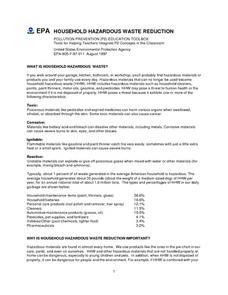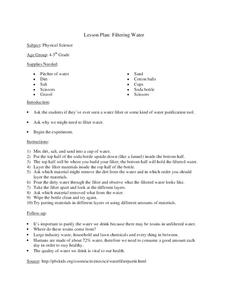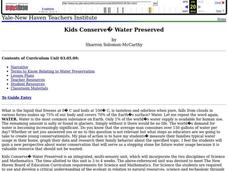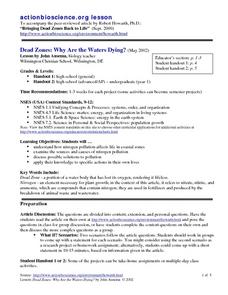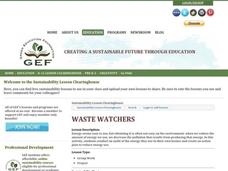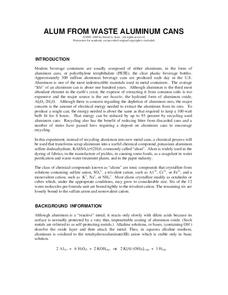Curated OER
Hazardous Waste Cleanup Methods
Students examine how hazardous wastes are cleaned up. They work together to identify the positives and negatives of cleaning up certain hazardous wastes. They answer questions as part of the activity.
Curated OER
Household Hazardous Waste Reduction
Students discover the different types of hazardous waste. They examine ways to dispose of the hazardous materials safely and without harming the environment.
Curated OER
TE Lesson: How Clean is that Water?
Students examine the factors the affect water quality, and allow for animals and plants to live. They look at how engineers apply water quality information when making stream modifications in order to ensure drinking water quality. They...
Curated OER
Kids Conserve? Water Preserved
Sixth graders review the steps of the water cycle. Individually, they calculate the amount of water they use in a day and identify ways they can conserve. As a class, they discuss how conserving water today helps future generations and...
Curated OER
How Much Water?
Students investigate amount of water available in different countries around the world, compare it to their daily water use, and explore how unequal distribution of water can cause challenges to survival. Students then discuss need to...
Curated OER
Filtering Water
Students investigate the need for filtered water. In this filtered water lesson, students explore the health hazards posed from consuming unfiltered water. Students construct a water filtration device.
Curated OER
Kids Conserve? Water Preserved
Students study conservation and how cities obtain their water. In this water lesson plan students view a PowerPoint presentation and draw a picture of the water cycle.
Curated OER
Testing Your Water
Students perform several water quality tests on groundwater from their area. They use test strips to determine the pH, hardness, alkalinity, nitrates, iron and chloride levels.
Curated OER
The New Haven Oyster Industry and Water Quality
High schoolers examine the different types of water pollutants and how they affect the waterways. For this environmental science lesson, students collect and interpret data from government agencies. They discuss how industrial...
Curated OER
Determination of Water Hardness
Students investigate water hardness. In this water hardness lesson plan, students determine the water hardness in 4 samples of water after buffering each. By using titration and an indicator, students can determine the amount of calcium...
Curated OER
Wasting Water
Learners participate in a hands-on experiment to discover why it is important to conserve water and explore common ways water is wasted. Students estimate the volume of water available on earth and calculate the volumes and costs of...
San Francisco Public Utilities Commission
Recycled Water: A Smart Way to Reuse Water
Learn about wastewater and recycled water with a science reading activity. After learners finish a two-page passage about conserving the water supply, they answer six comprehension questions about what they have read.
Curated OER
Our Natural Resources
Soil, water, fish, wildlife and forest are the main resources that are reviewed in this PowerPoint. Overuse and waste versus the value of the resources used and the long-term impact is covered in this clear presentation. It would be good...
Curated OER
Point- vs. Non-point Pollution
Students differentiate between point and non-point pollution and determine how the different types of pollution are harmful to aquatic ecosystems. They complete a series of tests on a sample of "polluted" water and a sample of "pure" water.
PricewaterhouseCoopers
Waste and Recycling: Recycling and Energy Recovery
Reduce, reuse, recycle, and recover. Young environmentalists learn about the overwhelming amount of garbage produced and discover better ways to minimize their impact on Earth by learning the difference between garbage and recyclables.
Curated OER
Water Down the Drain
Did you know that leaky faucets waste $10 million worth of water? Conservationists perform an experiment and draw best-fit lines to explore how the US Geological Society determined this value.
Curated OER
Dead Zones: Why Are the Waters Dying?
Students investigate the effects of pollution on marine ecosystems. They read and discuss an article, identify the effects of pollution on marine life, conduct research on local nutrient pollution, and conduct local water quality studies.
Curated OER
I'm Warm Now
Third graders graph how much water is wasted while waiting for it to get warm in the spigot in the sink. For this graphing lesson plan, student first predict how much water is wasted. That night they test it out at home and the next day...
Curated OER
Water Cycle Boogie
Students explore the water cycle. They learn the "Water Cycle Boogie." Students create hats to represent the different parts of the cycle and learn hand motions to go with the words of the song. Students practice singing the song and the...
Curated OER
Water Wars: Responsibility in the Age of Globalization
Students explore the concept of water as a resource and as a human right. In this conservation lesson, students record and chart personal water usage and consumption then brainstorm ways in which to responsibly reduce water waste.
Curated OER
Water Unit
Students explore ways to conserve water. After discussing water, its uses, and importance, students perform an experiment to discover how much water can be used when using a sponge. After creating water artwork, students determine how...
Curated OER
The Value of Water
Students determine the amount of water used or misused daily in a home. They identify ways to conserve use of water. They discuss why water is essential for day-to-day living and how water contributes to the standard of living for...
Curated OER
Waste Watchers
Energy-aware learners conduct an audit on their electricity usage by recording their electric meter reading and assessing the thermostat, light bulbs, windows, and water heaters in their homes. In class, they analyze results and discuss...
Chymist
Alum from Waste Aluminum Cans
Turn aluminum cans into pickles! An engaging experiment has learners chemically change aluminum into a substance with many purposes including the manufacture of pickles. After performing the chemical conversion, the experimenters verify...



